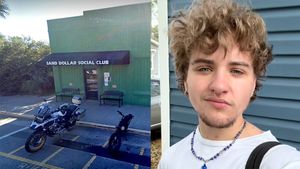On Halloween night my freshman year of college, I drove off campus and stopped in the empty parking lot of a small United Methodist Church about five miles outside of town. I turned off the car, called my best friend, and came out for the first time.
The phone call in that little church parking lot was full of laughter and relief. As I pulled back onto the highway I looked at the little United Methodist Church in the rearview mirror and realized that the members of this church would likely never know that their church served as a comforting and empowering backdrop to one of the most significant moments of my life.
For most of my life now I have been in leadership in the United Methodist Church. My leadership in the larger church began when I was 14 years old. By my junior year of college I chaired the committee on the church's stance on the inclusion of LGBTQ persons.
When I began to work from the inside to change the church's stance on LGBTQ topics I was focused on working to change the church so that the United Methodist Church would be relevant to society and have a future.
I now understand God's call on my life to be a part of leadership was to work to assert for our right as LGBTQ people to have meaningful spiritual lives and our right to be full members of the church universal.
The committee I chaired on the inclusion of LGBTQ persons was the first and only in the history of the United Methodist Church to vote to remove the language from our church doctrine that says that LGBTQ persons are "incompatible with Christian teaching."
The backlash from the fundamentalist arm of the church was immediate. They are so threatened by the refusal of LGBTQ persons to accept religion as a tool of control and discrimination.
Perpetuators of fundamentalist faith are using topics related to LGBTQ people to rip the church apart and to block us from accessing spiritual respect. As we have made advancements in the secular society they have tightened their grip on religion.
They have lost the secular fight for marriage equality so now they seek to completely block us from finding church homes and from serving in leadership. They have failed to block talented LGBTQ people from serving in politics, education, and business and think they can stop us from serving as pastors and spiritual leaders.
LGBTQ people have made numerous contributions to the United Methodist Church throughout our history. We have served as lay leaders, staff, pastors, and even bishops. Our commitment to social justice and our core belief system have been distinctly attractive to LGBTQ persons and those called to lead.
The founder of Methodism, John Wesley, developed a four piece approach to how to be a person of faith that balances reason, experience, scripture, and tradition.
LGBTQ people are spiritual people. The act of coming out is among the most spiritual experiences anyone can go through. The United Methodist Church is a fitting home for LGBTQ people who understand the power of their personal experiences and how it is a part of our faith.
At the end of February the United Methodist General Conference met in St. Louis and voted to harshen the penalties for pastors who perform weddings for LGBTQ couples and for pastors who serve openly as LGBTQ. This action is a part of a decades long attempt to erase the contributions of LGBTQ people in the church and to make the church so conservative that it is unrecognizable.
Let me tell you about the real United Methodists that I have come to know in my life. My home church threw my husband and I a party when we got married-like a huge party. When I came out my parents (who are both United Methodist pastors) took me out to my favorite restaurant to celebrate.
When my husband and I joined the church we were members of in California, multiple people from the congregation stood up front with us to celebrate the moment we were welcomed into the full life of the church.
Once when I prayed at a large church conference that the church would stop seeking to harm LGBTQ people, I turned around and saw over 200 people laying their hands on me and on each other while one of our most gifted Bishops cried with me.
The time has come for our backlash. The church universal is not a country club, a conservative political party, or a hate group. The United Methodist Church and other faith traditions can't legislate us away. The church is us -- people with a story of courage and fulfillment in living out our lives as God created us to. People who have experienced miracles and moments we can't explain in the midst of trying times and the fear that we won't be safe or accepted. People who love their neighbors and want to help them.
It is time for us to end the religious debate about the worthiness of LGBTQ persons to be spiritual and to be leaders in the church. The debate ends when we say it does. We know our truth. We are the only ones who can tell our particular stories.
More people within the church stand with us than ever before. I have watched God work on hundreds of people to step out and step up for our rights to be full members of the family of God.
If we believe that we have a right to spiritual expression and meaning as LGBTQ people then this is not the time to give up on the church. This is the moment to tell our stories. This is the time to show up to church.
Stonewall began a movement for us all to be able to be who we are and to love who we love openly in the public space. St. Louis served as a catalyst for our movement to be able to thrive as God's beloved inside and outside the walls of the church.
The church is for us. May our backlash begin.
 ANDREW PONDER WILLIAMS is a church consultant based in Arizona. He has held significant positions of leadership across the United Methodist connection and is a certified candidate for pastoral ministry.
ANDREW PONDER WILLIAMS is a church consultant based in Arizona. He has held significant positions of leadership across the United Methodist connection and is a certified candidate for pastoral ministry.















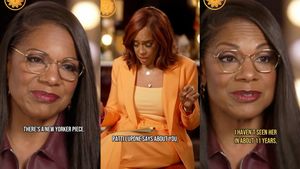


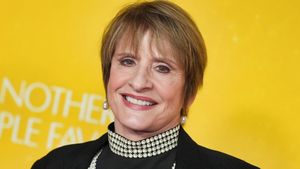

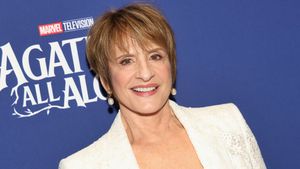








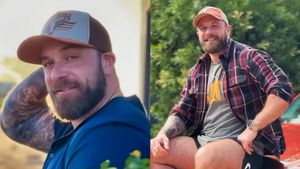


 ANDREW PONDER WILLIAMS is a church consultant based in Arizona. He has held significant positions of leadership across the United Methodist connection and is a certified candidate for pastoral ministry.
ANDREW PONDER WILLIAMS is a church consultant based in Arizona. He has held significant positions of leadership across the United Methodist connection and is a certified candidate for pastoral ministry. 

